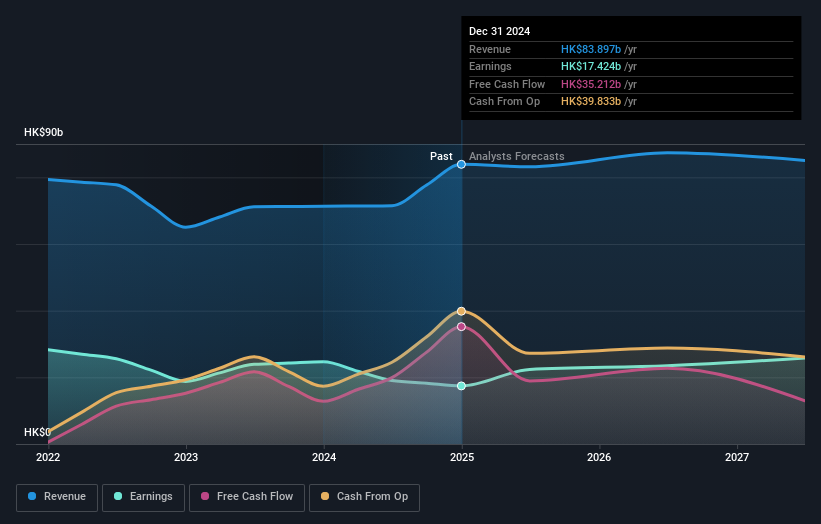
Key Insights
- Sun Hung Kai Properties' significant private companies ownership suggests that the key decisions are influenced by shareholders from the larger public
- 51% of the business is held by the top 8 shareholders
- Institutional ownership in Sun Hung Kai Properties is 18%
If you want to know who really controls Sun Hung Kai Properties Limited (HKG:16), then you'll have to look at the makeup of its share registry. And the group that holds the biggest piece of the pie are private companies with 49% ownership. That is, the group stands to benefit the most if the stock rises (or lose the most if there is a downturn).
As a result, private companies collectively scored the highest last week as the company hit HK$210b market cap following a 3.1% gain in the stock.
Let's take a closer look to see what the different types of shareholders can tell us about Sun Hung Kai Properties.
View our latest analysis for Sun Hung Kai Properties

What Does The Institutional Ownership Tell Us About Sun Hung Kai Properties?
Institutional investors commonly compare their own returns to the returns of a commonly followed index. So they generally do consider buying larger companies that are included in the relevant benchmark index.
As you can see, institutional investors have a fair amount of stake in Sun Hung Kai Properties. This implies the analysts working for those institutions have looked at the stock and they like it. But just like anyone else, they could be wrong. When multiple institutions own a stock, there's always a risk that they are in a 'crowded trade'. When such a trade goes wrong, multiple parties may compete to sell stock fast. This risk is higher in a company without a history of growth. You can see Sun Hung Kai Properties' historic earnings and revenue below, but keep in mind there's always more to the story.

Sun Hung Kai Properties is not owned by hedge funds. Our data shows that Adolfa Limited is the largest shareholder with 8.0% of shares outstanding. The second and third largest shareholders are Bertana Limited and Cyric Limited, with an equal amount of shares to their name at 8.0%. In addition, we found that Ping-Luen Kwok, the CEO has 2.3% of the shares allocated to their name.
On further inspection, we found that more than half the company's shares are owned by the top 8 shareholders, suggesting that the interests of the larger shareholders are balanced out to an extent by the smaller ones.
Researching institutional ownership is a good way to gauge and filter a stock's expected performance. The same can be achieved by studying analyst sentiments. There are plenty of analysts covering the stock, so it might be worth seeing what they are forecasting, too.
Insider Ownership Of Sun Hung Kai Properties
The definition of company insiders can be subjective and does vary between jurisdictions. Our data reflects individual insiders, capturing board members at the very least. The company management answer to the board and the latter should represent the interests of shareholders. Notably, sometimes top-level managers are on the board themselves.
Insider ownership is positive when it signals leadership are thinking like the true owners of the company. However, high insider ownership can also give immense power to a small group within the company. This can be negative in some circumstances.
Our most recent data indicates that insiders own some shares in Sun Hung Kai Properties Limited. It is a very large company, and board members collectively own HK$7.6b worth of shares (at current prices). Most would say this shows a good alignment of interests between shareholders and the board. Still, it might be worth checking if those insiders have been selling.
General Public Ownership
The general public-- including retail investors -- own 30% stake in the company, and hence can't easily be ignored. While this size of ownership may not be enough to sway a policy decision in their favour, they can still make a collective impact on company policies.
Private Company Ownership
Our data indicates that Private Companies hold 49%, of the company's shares. Private companies may be related parties. Sometimes insiders have an interest in a public company through a holding in a private company, rather than in their own capacity as an individual. While it's hard to draw any broad stroke conclusions, it is worth noting as an area for further research.
Next Steps:
While it is well worth considering the different groups that own a company, there are other factors that are even more important. Case in point: We've spotted 2 warning signs for Sun Hung Kai Properties you should be aware of.
If you would prefer discover what analysts are predicting in terms of future growth, do not miss this free report on analyst forecasts.
NB: Figures in this article are calculated using data from the last twelve months, which refer to the 12-month period ending on the last date of the month the financial statement is dated. This may not be consistent with full year annual report figures.
Have feedback on this article? Concerned about the content? Get in touch with us directly. Alternatively, email editorial-team (at) simplywallst.com.
This article by Simply Wall St is general in nature. We provide commentary based on historical data and analyst forecasts only using an unbiased methodology and our articles are not intended to be financial advice. It does not constitute a recommendation to buy or sell any stock, and does not take account of your objectives, or your financial situation. We aim to bring you long-term focused analysis driven by fundamental data. Note that our analysis may not factor in the latest price-sensitive company announcements or qualitative material. Simply Wall St has no position in any stocks mentioned.